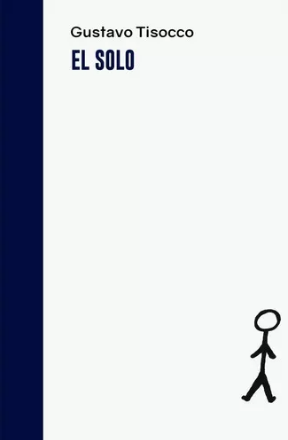Buenos Aires: Halley Ediciones, 2022. 88 pages.
 To trace with closed eyes a neat, orderly, and industrious path through solitude, to recognize its borders, its nooks, and crannies, its gears, its laws, and effects, should be a conferred, inborn ability to human beings, as an inherent virtue each of us could claim or boast. This is what Gustavo Tisocco suggests in his most recent book of poems, El solo, the title of which invites us to traverse the road of what we hold dear but, at the same time, of the abrasive, that which somehow—and a bit quintessentially—comprises vulnerability, abandonment, and the ever-pressing challenge of helplessness.
To trace with closed eyes a neat, orderly, and industrious path through solitude, to recognize its borders, its nooks, and crannies, its gears, its laws, and effects, should be a conferred, inborn ability to human beings, as an inherent virtue each of us could claim or boast. This is what Gustavo Tisocco suggests in his most recent book of poems, El solo, the title of which invites us to traverse the road of what we hold dear but, at the same time, of the abrasive, that which somehow—and a bit quintessentially—comprises vulnerability, abandonment, and the ever-pressing challenge of helplessness.
Gustavo Tisocco was born in 1969 in Mocoretá, Corrientes province, Argentina. He is a writer, poet, and pediatrician. Since 2006, he has run the website Mis poetas contemporáneos, where he showcases published and unpublished works by other poets. In recognition of this work—and its remarkable impact—he was awarded, in 2012, the Premio Puma de Plata from the Fundación Argentina para la Poesía. Many of his works have been translated into Italian, Portuguese, Catalan, English, German, and French. Some of his published works are Entre soles y sombras (2004), Paisaje de adentro (2006), Desde todos los costados (2008), Hectáreas (2017), and Perla del sur (2019).
The poems of El solo—brief, conclusive, sharp, titleless, categorically revealing of acuteness and certainties—evince the ways in which that solitude operates from the generic but also, and above all, from the singular and definitive: “a mordiscones / a latidos / a huesos superpuestos / y a pies agotados / uno se construye // después vendrá el amor / esa odisea / que nos condena / nos desmorona” [through big bites / through heart beats / through superimposed bones / and through weary feet / one builds oneself // then love will come / that odyssey / that condemns us / that which makes us fall apart].
An internal drive thus develops, in an intimate and introspective tone, which enables the coexistence of what “one is”—“aquí habitaron pájaros y ciervos / leones entre langostas / (…) pero llegó el aire helado / y sólo quedo yo / el incurable” [here lived birds and deer / lions among locusts / (…) but the icy air arrived / and it is just me left / the incurable]—with what “one chooses to be”—“elegir la piedra / acariciarla / y ser parte de la historia” [ to choose the stone / to stroke it / and to be part of history].
“In El solo the gaze is focused on the only possible heartening challenge: to review the possibilities that each ‘solitude’ offers us at every section of the route, each bifurcation, each interval.”
Despite it all, in this book, solitude, as the height of vital collective experience and as an essential map of a memory bringing into tension actions, spaces, and bodies, seems to have a structure, authority, and a conscience of its own.
The poems presented here are the accurately calculated combination of what the dictionary has promptly explained in detail (“carencia voluntaria o involuntaria de compañía // circunstancia de estar solo” [voluntary or involuntary lack of company // circumstance of being alone]) and that other solitude—allegorical, novelistic, figurative—the very solitude that Gabriel García Márquez knew how to elevate and convert into the metaphor par excellence of Universal Literature.
As the great Argentine poet Alejandra Pizarnik well warned us in her book Las aventuras perdidas: “Pero hace tanta soledad / que las palabras se suicidan” [But there is so much solitude / that words commit suicide]. Thus the route promises to be arduous, lacerating, and biased. At times, it will also be spine-chilling, even unfriendly. Given this vantage point, in El solo the gaze is focused on the only possible heartening challenge: to review the possibilities that each “solitude” offers us at every section of the route, each bifurcation, each interval. Any person who has experienced this state should experience the silent reading of this book. In conclusion, one is in solitude not because it is the ultimate destiny of humanity: “se está solo por elección / o no / pero siempre / se está solo” [one is alone by choice / or not / but always / one is in solitude].
Translated by Adriana Vega





